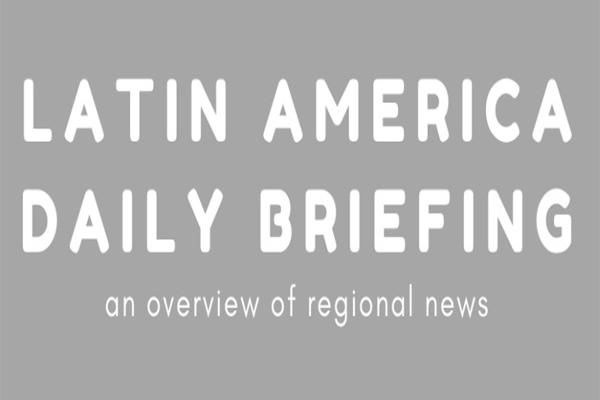
On the 28th anniversary of the deadly bombing of the Asociación Mutual Israelita Argentina (Mutual Israeli-Argentine Association, or AMIA), a Jewish community center in Buenos Aires, Argentina hosts the second Latin American Forum to Combat Antisemitism, reports Clarín. The forum, organized by the Jewish Latin American Congress and the Israeli Ministry of Foreign Affairs, will host US Special Envoy to Monitor and Combat Antisemitism Deborah Lipstadt and her OAS counterpart, Fernando Lottenberg, as well as former Guatemalan president Jimmy Morales and president of the Yad Vashem Holocaust memorial museum Dani Dayan.
The deadliest terrorist attack in Argentina’s history, the AMIA bombing left 85 people dead and over 300 injured. Iran has long been accused of enacting the bombing, though no perpetrators have been brought to justice. This year’s AMIA anniversary comes amidst recent controversy over a Venezuelan-flagged plane with an Iranian operator that landed in Ezeiza last month following a suspicious flight pattern. The incident spurred questions about Iranian ties to the current Argentine administration. Former president and current vice president Cristina Kirchner has been accused of conspiring with Iran during her presidency to obstruct an investigation into the 1994 bombing, though she has since been acquitted, writes the New York Times.

Migration
- Panama and Colombia plan to develop a “safe path” so that migrants don’t have to cross the treacherous Darien Gap. More than 28,000 Venezuelan children and thousands of Haitians and Cubans have crossed the jungle region since the start of 2022, reports La Patilla.
Colombia
- Experts predict that reopening the Colombia-Venezuela border will create between 20,000 and 45,000 jobs, reports Crónica Uno. President-elect Gustavo Petro promises to reopen the border.
Brazil
- Leading presidential candidate Lula promises that he would appoint a politician—not an economist—as Minister of the Economy, if elected. This would be in order to facilitate dialogue with the legislature, although the minister would be surrounded by a cadre of economic advisors, notes Estadão.
- Last weekend, Guarani-Kaiowá indigenous persons reported a string of attacks against community members in Mato Grosso do Sul, near the Brazil-Paraguay border, reports Folha.
- Although authoritarianism typically seeks to curtail academic freedom, “it is important to recognize that the current government failed to tame and control the country’s remarkable public university system. Although it is true that financial restrictions have been compromising several areas of research and have made it more difficult for poor and minority students to proceed with their studies, Brazilian universities held on,” writes Sidney Chalhoub in a feature article for the Washington Brazil Office.
Peru
- Last week, the Peruvian Supreme Court afirmed the right to euthanasia, despite laws prohibiting it, “In Latin America, only Colombia allows the procedure, but under certain conditions,” reports Reuters.
- A recent protest in Espinar, in Peru’s Cusco department, is representative of indigenous political agency and autonomy. Opposed to neoliberalism and extractive industries, “Espinar is but a flashpoint, a site where communities have long operated under different terms and conceptualizations of power, with the paro serving as one manifestation of this alternative politic,” writes George Ygarza for NACLA.
Chile
- Amid falling support for the draft constitution to be voted on in September, President Boric said last Friday that “a new draft would have to be written up from scratch instead of modifying the current text,” reports Reuters.
- With the Chilean peso hitting record lows in comparison to the US dollar last week, the country’s central bank “announced a $25 billion intervention in the foreign exchange market to support the peso,” resulting in a nearly 8% gain by close of business Friday, notes Reuters.
Regional
- “The second pink tide is likely to be shorter-lived and more turbulent than the first,” writes Oliver Stuenkel for Americas Quarterly. A change in commodity prices, polarization, and lack of emphasis on regional relations differentiate this wave of leftist candidate wins from the previous wave.
Caribbean
- Russia’s invasion of Ukraine has had geopolitical and geo-economic implications for the Caribbean, exacerbating food insecurity, increasing external debt burdens, and a treacherous business environment, writes Scott MacDonald for Global Americans.
Mexico
- Rafael Caro Quintero, one of the 3 founding members of the Guadalajara Cartel, was arrested in Sinaloa last week, reports the BBC. He is no longer a prominent drug trafficker, but his arrest is viewed as symbolically important, particularly for the DEA, due to his involvement in the torture and death of agent Kiki Camarena in 1985.
Venezuela
- Alumni elections at the Universidad Central de Venezuela last week saw defeat for chavismo across much of the university, with the ruling PSUV party winning just 5 of 49 schools, according to Efecto Cocuyo.
Arianna Kohan and Jordi Amaral / Latin America Daily Briefing
http://latinamericadailybriefing.blogspot











